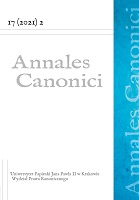Kanon 1311 § 2 kodeksu prawa kanonicznego jako program odnowionego prawa karnego kanonicznego. Pierwsze uwagi
Canon 1311 § 2 of the Code of Canon Law as a programme for a renewed canonical penal law. First remarks
Author(s): Piotr SkoniecznySubject(s): Christian Theology and Religion, Canon Law / Church Law, Penal Policy
Published by: Wydawnictwo Naukowe Uniwersytetu Papieskiego Jana Pawła II w Krakowie
Keywords: Canon penal law; 2021 amendment; can. 1311 § 2 CIC/21;
Summary/Abstract: The article is a systematic commentary on the new can. 1311 § 2 CIC/21. The Author reads this provision as a programme of the renewed Book VI of CIC/21. He summarizes this programme in three dimensions (and parts of this article): I. the role of the ecclesiastical superior in the Church’s exercise of her right to punish the faithful; II. the meta-principles of penal law in the Church: III. the functions of canonical penal law and canonical punishment. According to the Author, the commented provision has a pastoral character and should be applied by every ecclesiastical superior, not only the Ordinary (I.1.). Following the theology of St. Thomas Aquinas, he acknowledges that the object of penal law protection in the Church is the common good (bonum communitatis), and hence the addition singulorumque christifidelium is unnecessary (I.2.2.). The Author points out that the new canon penal law extends the legal obligation to initiate a criminal trial to all criminal cases (I.2.3.1.) and regrets that the reform is not accompanied by an amendment of the criminal procedure (I.2.3.2.). In line with the canonical tradition, he explains the threefold role of the ecclesiastical superior in criminal matters: as shepherd, father and judge (I.3.), but with the canonical penalty as ultima ratio (I.3.3.). The Author points out that can. 1311 § 2 CIC/21 introduces the principle of pastoral charity (caritas pastoralis), emphasises the canonical understanding of the rule of law (cum aequitate canonica) and the principle Nulla poena sine processu (II.). As regards the functions of canonical penal law, the Author rejects the teaching of secular criminal law in this respect and points to three in the revised Book VI CIC/21, mentioned in fine can. 1311 § 2 CIC/21 (III.1.), which he then analyses, often referring to the teaching of St. Thomas Aquinas (III.3.). For the Author the new can. 1311 § 2 CIC/21 is the gateway (ianua) of the new penal law of the Latin Church.
Journal: Annales Canonici
- Issue Year: 17/2021
- Issue No: 2
- Page Range: 101-142
- Page Count: 42
- Language: Polish

